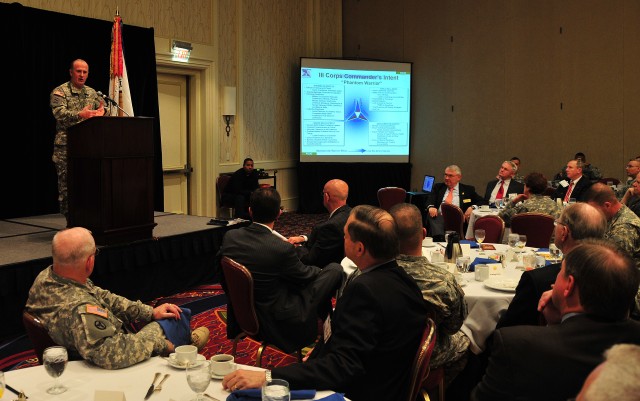
WASHINGTON (Army News Service, April 9, 2009) - The commanding general of III Corps said that it was essential for Soldiers to be trained and ready to operate not only in counterinsurgency operations, but also in high-intensity combat operations.
Speaking today at the Association of the United States Army's Institute of Land Warfare breakfast in Arlington, Va., Lt. Gen. Rick Lynch cited the example of the corps headquarters' recent deployment to Korea for an exercise emphasizing conventional warfare.
He said it also means ensuring that his Soldiers have individual and collective training for the full spectrum of military operations. "They have to have that skill set," he told the 150 attendees.
Lynch said the corps is made up of about 63,000 Soldiers and that about one-third of the corps just returned home; another one-third made up of the 4th Infantry Division and the 3rd Armored Cavalry Regiment are presently deployed. And another third consisting of the 13th Sustainment Command (Expeditionary) headquarters and the 1st Air Cavalry Brigade are getting ready to deploy.
"All is manageable; all difficult," he said. "Synchronizing the ARFORGEN (Army Force Generation Model) process is difficult."
Looking at force well-being, he said the stress "we're experiencing is palpable in the eyes of the families."
He described steps the corps has taken to reduce that stress, including not working weekends without his specific approval nor working past 6 p.m. and sending Soldiers home at 3 p.m. on Thursdays "to put families first... this forces leaders to use their time wisely."
He also wants his Soldiers to have by Thursday afternoon their training schedules for the coming week so families can plan around them.
Lynch said he tries to instill in his meetings with incoming Soldiers and at social gatherings that "it's okay to have fun," adding that he wants to make these days the "good ole days."
He added that he "demands engaged leadership" and he's seeking to empower his junior leaders in how to deal with their Soldiers' and their families' grief and sorrow. "It's all about communication."
To help Soldiers develop professionally, the corps has scheduled monthly counseling sessions for every Soldier where they and their leaders review how goals were met or missed and set objectives for the following month and how to achieve them. Lynch said it's a contract between Soldiers and their leaders.
(John Grady serves as director of communications for the Association of the United States Army.)

Social Sharing